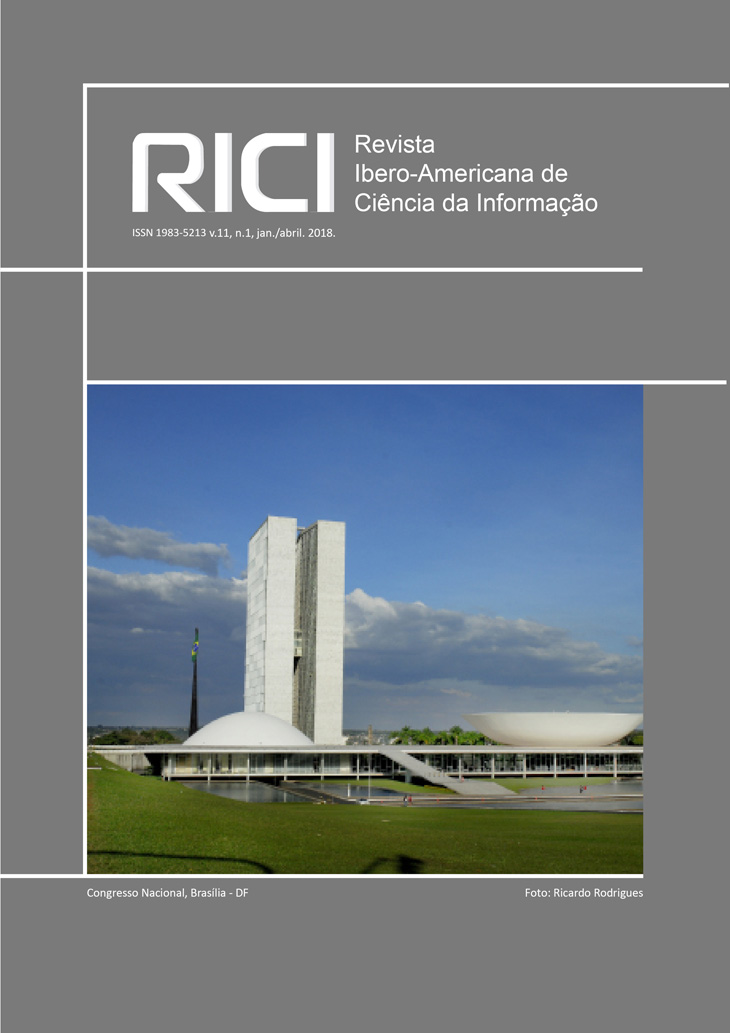Scientific initiatives of archiving and preservation of contents in social media: current overview
DOI:
https://doi.org/10.26512/rici.v11.n1.2018.8538Keywords:
digital preservation, social media, TwitterAbstract
The study carries out a mapping of scientific experiments that collect and archive social media content. It presents initially a brief theoretical reference related to digital preservation and Web 2.0. Qualitative research with an exploratory approach since it sought to identify in the innovative experiences questions little investigated, such as the characteristics: technological (social media platform used, technological solution used to collect the data and format of storage of the collected data); and contextual checks to see if the metadata guarantees provenance, authenticity, and how rights management and types of data access are. The results indicate that, although the focus of these initiatives is not directly on preservation, this issue is intrinsically considered. Twitter is the primary platform for data collection used by researchers. Several are the challenges listed, it is necessary to specify how and by whom the data collected will be used and relevant should be the curatorial action in these projects, to select what should in fact be saved. Finally, the restrictions of social media platforms and the lack of transparency and understanding about their data management practices currently make it difficult to preserve this type of content.Downloads
References
BBC BRASIL. O que é Brexit e como pode afetar o Reino Unido e a União Europeia? 2016. Disponível em: http://www.bbc.com/portuguese/internacional-36555376 Acesso em: 7 maio 2017.
CONSELHO NACIONAL DE ARQUIVOS (CONARQ). Coletânea da Legislação Arquivística Brasileira e Correlata. Rio de Janeiro: Arquivo Nacional, 2017. Disponível em: http://www.conarq.arquivonacional.gov.br/index.php/coletanea-da-legislacao-arquivistica-e-correlata Acesso em: 10 ago. 2017.
DIGITAL PRESERVATION COALITION (DPC). Creating digital materials. Glasgow, UK, 2017. Disponível em: http://dpconline.org/handbook/organisational-activities/creating-digital-materials Acesso em: 31 out. 2017.
ERWAY, R.; RINEHART, A. If you build it, will they fund? making research data management sustainable. Dublin, OH: Online Computer Library Center, 2016. Disponível em: http://www.oclc.org/content/dam/research/publications/2016/oclcresearch-making-research-data-management-sustainable-2016.pdf Acesso em: 1 ago. 2017.
HOCKX-YU, Helen. Archiving social media in the context of non-print legal deposit. In: IFLA WORLD LIBRARY AND INFORMATION CONGRESS, 80., 2014, Lyon, França. Proceedings… Lyon, França: IFLA, 2014. Disponível em: http://library.ifla.org/999/1/107-hockxyu-en.pdf Acesso em: 10 ago. 2017.
LAVOIE, Brian; GARTNER, Richard. Technology watch report: preservation metadata. Dublin, OH: OCLC, 2005. Disponível em: http://www.dpconline.org/docman/technology-watch-reports/88-preservation-metadata/file Acesso em: 10 ago. 2017.
OETTINGER, Günther. Open science for a knowledge and data-driven economy. Brussels: European Community, 2015. Disponível em: https://ec.europa.eu/digital-single-market/en/news/open-science-knowledge-and-data-driven-economy Acesso em: 11 ago. 2017.
ORGANIZAÇÃO DAS NAÇÕES UNIDAS PARA A EDUCAÇÃO, A CIÊNCIA E A CULTURA (UNESCO). A memória do mundo na era digital: digitalização e preservação. Brasília, DF, 2012. Disponível em: http://www.unesco.org/new/fileadmin/MULTIMEDIA/HQ/CI/CI/images/mow/unesco_ubc_vancouver_declaration_pt.pdf Acesso em: 10 ago. 2017.
O’SULLIVAN, B. (Org.). The Magna Carta for Data Project. In: EUROPEAN COMMISSION’S ANNUAL MEETING OF THE JOINT RESEARCH CENTRE COMMUNITY OF PRACTICE ON BIG DATA, 1., 2016, Ispra, Italy. Proceedings… Ispra, Italy: INSIGHT (CENTRE FOR DATA ANALYTICS), 2016. Disponível em: https://www.insight-centre.org/content/magna-carta-data-project Acesso em: 7 maio 2017.
PENNOCK, Maureen. Web archiving. Glasgow, UK: Digital Preservation Coalition, 2013. 50 p. ISSN 2048 7916. Disponível em: www.dpconline.org/component/docs/doc_download/826-webarchivingpreviewmarch2013 Acesso em: 10 ago. 2017.
SALAHELDEEN, Hany M.; NELSON, Michael L. Losing my revolution: how many resources shared on social media have been lost? Ithaca, NY: Cornell University Library, 2012. Disponível em: https://arxiv.org/pdf/1209.3026.pdf Acesso em: 10 ago. 2017.
SAYÃO, Luís Fernando. Uma outra face dos metadados: informações para a gestão da preservação digital. Encontros Bibli: Revista Eletrônica de Ciência da Informação, Florianópolis, v. 15, n. 30, p.1-31, 2010. Disponível em: https://periodicos.ufsc.br/index.php/eb/article/view/12528 Acesso em: 17 mar. 2017.
SHEEHAN, Jerry. Making Federal Research Results available to all. [Washington]: The White House, 2017. Disponível em: https://obamawhitehouse.archives.gov/blog/2017/01/09/making-federal-research-results-available-all Acesso em: 10 ago. 2017.
THOMSON, Sara D. Preserving Social Media. London: Digital Preservation Coalition, 2016. 47 p. ISSN 2048-7916. Disponível em: http://dx.doi.org/10.7207/twr16-01 Acesso em: 10 ago. 2017.
UK DATA FORUM. UK strategy for data resources for social and economic research: a five-year plan to inform and guide the development and utilization of data and related resources for social and economic research. [London], 2013. Disponível em: http://www.esrc.ac.uk/files/research/uk-strategy-for-data-resources-for-social-and-economic-research/ Acesso em: 10 ago. 2017.
UNIVERSITY OF LONDON. COMPUTER CENTRE (ULCC); UKOLN. Preservation of web resources handbook. [London], 2008. Disponível em: http://www.jisc.ac.uk/publications/programmerelated/2008/powrhandbook.aspx Acesso em: 10 ago. 2017.
WORTHAM, Jenna. How an archive of the Internet could change history. The New York Times Magazine, New York, p. MM18, June 21, 2016. Disponível em: https://www.nytimes.com/2016/06/26/magazine/how-an-archive-of-the-internet-could-change-history.html?_r=0 Acesso em: 30 out. 2017.
Downloads
Published
How to Cite
Issue
Section
License
Copyright (c) 2021 Laura Vilela Rodrigues Rezende, Dalton Lopes Martins

This work is licensed under a Creative Commons Attribution 4.0 International License.
Copyright Notice
Authors who publish in this journal agree to the following terms:
- Authors retain copyright and grant the journal right of first publication with the work simultaneously licensed under the Creative Commons Attribution License 4.0, allowing the sharing of work and recognition of the work of authorship and initial publication in this journal.
- Authors are able to take on additional contracts separately, non-exclusive distribution of the version of the paper published in this journal (ex.: distribute to an institutional repository or publish as a book), with an acknowledgment of its initial publication in this journal.
- Authors are permitted and encouraged to distribute their work online (eg.: in institutional repositories or on their website) at any point before or during the editorial process, as it can lead to productive exchanges, as well as increase the impact and citation the published work.
















